- California Assembly OKs highest minimum wage in nation
- S. Korea unveils first graphic cigarette warnings
- US joins with South Korea, Japan in bid to deter North Korea
- LPGA golfer Chun In-gee finally back in action
- S. Korea won’t be top seed in final World Cup qualification round
- US men’s soccer misses 2nd straight Olympics
- US back on track in qualifying with 4-0 win over Guatemala
- High-intensity workout injuries spawn cottage industry
- CDC expands range of Zika mosquitoes into parts of Northeast
- Who knew? ‘The Walking Dead’ is helping families connect
North Korean defector rapper won’t rest until unification
By Kim Hye-kyung
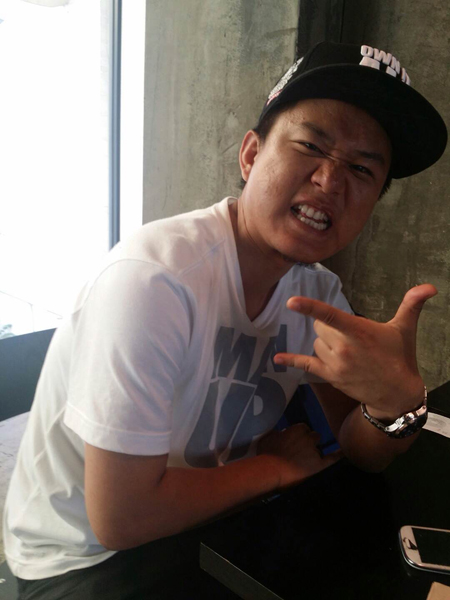
Art student Kang Chun-hyuk, a North Korean defector, poses for a photo during an interview at a cafe in Hongdae, western Seoul. (Kim Hye-kyung/The Korea Times)
In many ways, Kang Chun-hyuk is a typical student. He dresses in a T-shirt and baseball cap, loves hip-hop and spends most of his time at Hongik University in western Seoul, where he majors in art.
His life, however, has been anything but ordinary.
Kang, 28, escaped from North Korea with his family in 1998, making the perilous journey through China and Southeast Asia before arriving in Seoul. Like other young defectors, he faced identity issues in the South, a vastly different world compared to where he grew up.
In addition to being a visual artist, Kang is a hip-hop MC. He showcased his rap skills last month on the music competition show “Show Me the Money” ― and wowed the judges with his impassioned, critical lyrics about the Kim Jong-un regime.
Kang says he uses his art to tell the world about the difficulties facing the North Korean people, including those who defect.
“I will let the world know about the plight of North Koreans until the North and South are reunified,” he told The Korea Times in a recent interview.
It was a long, tough journey for Kang to arrive where he was last month ― on a nationally televised stage, speaking out against the regime he once lived under.
Born in Onseong, northeastern North Korea, he was 12 when his family decided to defect.
By that time, he already realized how Pyongyang’s ruling Kim family had deceived the populace, telling them it was the people of the South, not the North, who were living in poverty.
Despite the North’s rigid control over its people, Kang managed to discover his passion for art.
“I really liked to draw pictures,” he explained. “Painting supplies were scarce, but I’d just draw with a pencil. It was my great pleasure.”
He recalls the cold, dark sky when his family set off at dawn one morning; and the ice-cold water of the Tumen River as they waded their way to China.
It took the family three years to arrive in the South via Beijing, Laos and Cambodia. During the journey, he said they had several brushes with death. Luckily for them, they were aided by Korean-Chinese people who support defectors.
Finally, they arrived at Incheon International Airport.
“The South looked 30 years more advanced than the North,” he said.
Like many other defectors, Kang had problems adjusting to the South. He was placed in middle school despite being 16, much older than his peers. The school expelled him after he got involved in fights.
Kang worked for a while in construction before deciding to pursue his passion for art. When he did, he breezed through examinations and was admitted to Hongik, which has a prestigious art program.
Despite his success as a student, his past is never far behind. Last year, his mother passed away from tuberculosis. Kang links the illness to the years she spent working in North Korean mines.
Such experiences are a recurring theme in his art.
“You took money that we made digging in the earth to fund nuclear weapons,” he rapped on Show Me the Money. “What my mother got from the mines was tuberculosis. What you got from her labor was money.”
In one of Kang’s paintings, a North Korean soldier points a gun at a parent and child as they cross the river to China under a blood-red sky. Another soldier is sleeping next to him.
Another image shows authorities dragging a man away as a child watches helplessly.
Perhaps the most striking painting features a young man’s face. One of the eyes resembles a South Korean flag; the other, a North Korean flag.
“I have lived in North Korea and South Korea for 12 years each, and I spent three years in China, but I feel like I am neither a part of South Korean society nor North Korean society,” he said.
Kang vowed to continue painting, rapping and raising awareness until unification occurs.
“I know there are many South Koreans who are against unification because of the financial burden. But we have to remember that the North and South Korean people are one people,” he said.
“We can ― and have to ― overcome the difficulties after unification, together.”








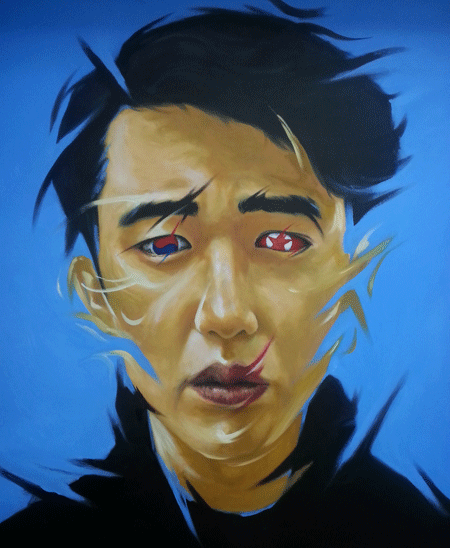
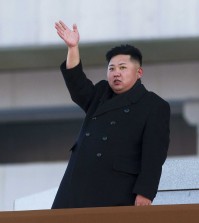
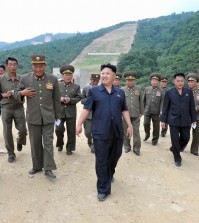
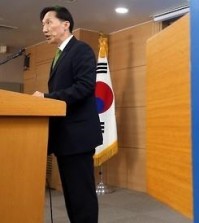
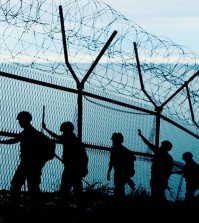





Pingback: North Korean defector rapper won't rest until u...
Pingback: #5. Expert: U.S. should shift Korea policy focus from nuclear problem to unification | Jenny's blog